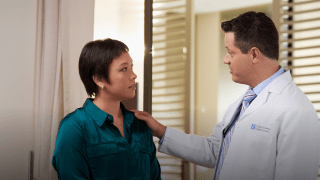
Learn How to Navigate a Cancer Diagnosis
The myriad of emotions following a cancer diagnosis are often difficult to process. Though types of cancers vary and everyone copes in uniquely individual ways, here are answers to some of the most common questions we hear. We’re humbled to help you begin navigating the journey back to health.
Yes. 20% of people with serious illnesses are misdiagnosed*. Complicating the issue, many cancers can present with similar symptoms. Highly specialized testing alongside advanced imaging techniques performed at a treatment center focused only on cancer, ensure an accurate diagnosis and more targeted course of treatment. Whether for a first opinion, or a second, you deserve peace-of-mind.
*Washington Post, Lenny Bernstein, 4/4/17
Start by asking questions. A lot. No question is too big or too small. Many cancers have multiple treatment options, and you and your doctor should identify the ones most appropriate for your cancer and lifestyle. Surgery? Medication? Chemotherapy? Clinical trial? Ask about the risks and side effects of each. Try to steer clear of the Internet (rife with inaccuracies) and instead rely on the expertise of your cancer team. An accurate treatment plan is critical to avoiding complications and/or delays with healing.
Speed matters with a cancer diagnosis, but consider focusing on “mindful” speed. Seek the most capable hands from the beginning. Look for a National Cancer Institute (NCI) designation. Find a place that doesn’t just treat cancer, but conducts ongoing cancer research so you’re first in line for the latest breakthroughs. Ensure your team has experience with your specific type of cancer. It’s important to develop a trusted relationship with an A-team from the first days of your diagnosis, through treatment, and into survivorship.
You always have a choice not to treat, however doctors who advise treating the cancer are doing so because the pros of treating outweigh the risks of not. If you’re considering forgoing or delaying treatment, be sure to have a candid talk with your doctor about all the risks and side effects.
If eligible and cleared by your doctor to participate in a clinical trial, you’re officially part of revolutionizing the science of cancer treatment for yourself, and the world. Clinical trials test safety-approved treatment protocols, medications, and more, on human patients to determine effectiveness. Countless lifesaving cancer drugs were first introduced via clinical trials. Clinical trials should be done under the careful supervision of cancer researcher and physician teams. Receiving care at a cancer center conducting hundreds of clinical trials, ensures better access to a novel drug or treatment targeted for your specific type of cancer.
Expertise. Expertise. Expertise. We can’t say it enough. Ensure your team of physicians is highly regarded and highly experienced in treating your type of cancer. Meet them. Do you connect? Do you feel listened to? Do you feel like all your questions are being answered? Do you feel supported emotionally? You certainly need a team of world-renowned physician scientists on your side, but you also want compassionate humans who are tightly integrated in your care plan during each step of your treatment.
Just as all physicians are not the same, neither are treatment centers. First, cancer belongs in a cancer center where cancer and only cancer is studied, researched, and treated. Second, let’s talk research. Not all cancer centers conduct ongoing academic research or hundreds of clinical trials, in which case you might be missing out on breakthrough discoveries delivered straight from the lab to you. Accuracy. Expertise. Speed. Make sure you can confidently check those off before committing to treatment anywhere.
Keep it simple. Keep it low stress. Keep it close. The three things you should consider when determining the geographic “where” of cancer treatment. Traveling to multiple locations for radiology, labs, appointments, chemotherapy etc., can be terribly taxing on you and your family. Look for a cancer center that is essentially a “one-stop” all-access campus, home to leading-edge technology, diagnostics, treatments, art spaces, healing places, and so much more.
The cancer treatment centers with the most positive outcomes don’t just address the cancer, they address and support the whole body. Find a center that understands the importance of mind, body, and soul working in symbiotic union to facilitate healing. Beyond medical support, a holistic-minded cancer center might offer assistance with financial concerns, guided meditation, mental health support, nutrition and exercise therapies. Because your well-being is hardly one-dimensional, your cancer care shouldn’t be either.
We hope this helped answer your most pressing questions and set you on a path towards making some important decisions. If you’d like to make an appointment to discuss your diagnosis and options, we’re here to help.